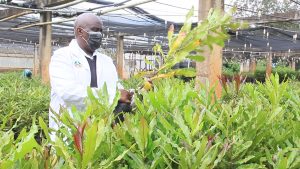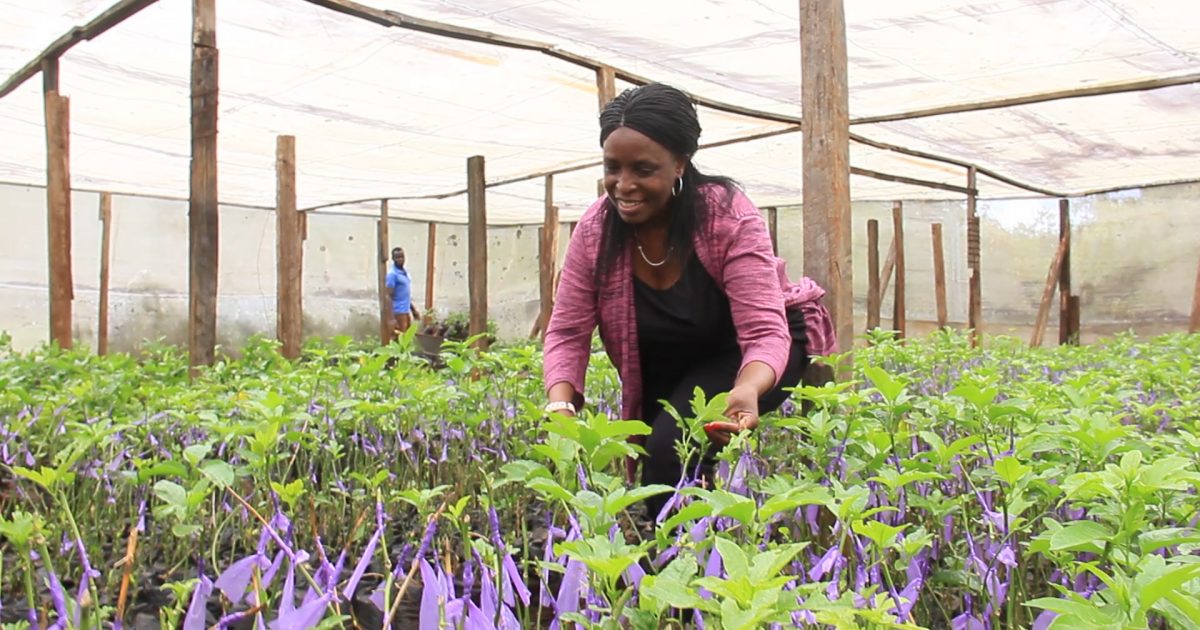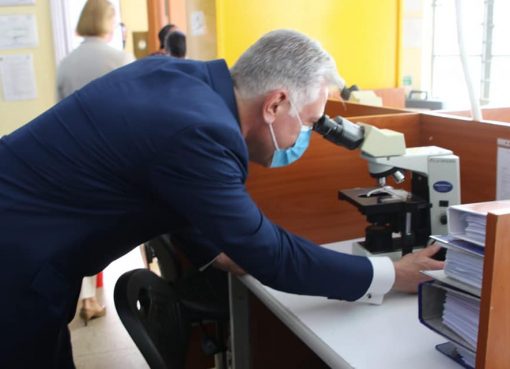The Kenya Livestock Research Organization (KALRO) and the European Union (EU) funded Market Access Upgrade Programme (MARKUP) have embarked on promoting new farming technologies for breeding multiple disease free and high yielding macadamia and passion fruit planting material in a bid to enhance quality and safety standards for export market.
Antony Nyaga a Phytologist at KALRO’s Macadamia Center, noted that as the global macadamia industry continues to grow, the need to deliver exceptional quality nuts was becoming more critical than ever before.

The Phytologist said that this is where the biggest challenge for Kenya’s market competitiveness in the global arena lies because farmers are not faithful to producing quality nuts due to the low support the sector receives from other actors.
“Global demand for the nuts has risen over the years. We sell over 98 per cent of our macadamia to global markets. Our buyers dictate quality. If we don’t adhere to best practices in this highly competitive market, we will be edged out, and one way of doing this is by ensuring that the bulk of our macadamia farmers have easy access to high quality planting material,” observed Mr Nyaga.
The venture is targeting farmers in 12 counties who will be trained on the appropriate methods to use in grafting macadamia and passion seedlings that can contain diseases and pests as a way of protecting the country’s European and other international markets.
“With the declining fortunes in the tea and coffee sector, macadamia nuts and passion fruits are coming up as an alternative source of income for farmers in central Kenya and other non-traditional growing areas such as the Rift Valley and Western Kenya,” observed the scientist.
The Sh473.9 million MARKUP which is anchored within the Ministry of Industry, Trade and Cooperatives also aims at improving the competitiveness of small-scale farmers within the targeted 12 counties in a variety of crop value chains, including mango, passion fruit, snow peas, French peas, horticulture, herbs and spices and nuts.
The counties are Nakuru, Bungoma, Busia, Homa Bay, Siaya, Trans Nzoia, Uasin Gishu, Taita Taveta, Kwale, Makueni, Machakos and Kajiado.
Mr Nyaga indicated that despite the fact that a mature macadamia tree can produce between 80kg and 300kg of nuts, most farmers in the country harvest between 30kg and 50kg exposing them to unnecessarily high production costs and reduced returns as a result of low-quality seedlings.
The scientist noted that the situation had been aggravated by the labour intensiveness and high cost of producing certified planting material.
“It takes between 15 to 18 months to get a mature macadamia seedling, making it a very expensive process. Private nurseries charge between Sh400 and Sh600 for a single seedling of the crop which is way beyond the reach of most farmers,”
The Phytologist revealed that most commercial nurseries were located around Central Kenya Highlands making access of clean planting material to farmers in other parts of the country difficult.
He added, “One mature seedling of Macadamia weighs more than two kilograms, this implies that due to this heavy weight a smallholder farmer from another part of the country may not afford transport costs.
Our joint venture with MARKUP will be to train on new techniques of grafting Macadamia seedlings which are high yielding, drought, disease and pest resistant and which can withstand extreme weather conditions. The cost of seedlings will come down if more farmers are trained to prepare clean planting material,”
According to Nyaga, all seedlings from KALRO are grafted to ensure the quality and quantity of the produce per tree as the nut processors are currently looking for the new variety, because it produces more and quality oil as compared to the nuts from the indigenous varieties.
Head of KALRO Seed Unit Ms Grace Watani, said farmers needed clean planting materials which were resistant to pests and diseases that continue to pose a serious threat to the Country’s international markets, sometimes resulting in interceptions on Kenya’s agricultural produce.
“The collaboration with MARKUP in training farmers on preparation of proper planting material will lead to increases in the quality and volume of the produce.
At the same time, this will enhance the competitiveness of Kenyan agricultural products to access markets, generate more foreign exchange, and improve the socio-economic conditions of the farmers,” stated Ms Watani.
She indicated that KALRO will work with county governments, state agencies and the private sector in training both small holder and large-scale farmers to prepare grafted seedlings of yellow passion which is high yielding, tolerant to diseases and bugs, and cuts growing costs by half, compared to the traditionally farmed purple passion fruit.
The yellow variety released by KALRO’s Thika centre several years ago took 10 years of research, cross breeding and upgrading with local species. From planting, it takes nine to 10 months to get the first fruits almost the same time as purple.
But its yields per hectare range from 30 to 40 tonnes per harvest compared to 15 for the purple variety.
“The yellow variety seedlings are developed through grafting root stock of sour yellow passion with the scion of purple passion,” she offered.
Yellow passion farmers realize higher profits due to lower growing costs since the purple passion fruit requires spraying six times each fruit season, compared to three times a season for the yellow variety.
According to Ms Watani the yellow passion fruit is resistant to Fusarium wilt, and is also tolerant to phytophthora root rot, nematodes, brown spot and woodiness virus.
She explained that industrial fruit processors are also opting for the yellow passion over the purple passion, because it is sweeter, less acidic and bigger, meaning it has more juice.
In addition, the yellow passion fruit converts into 35 per cent juice, compared with 20 to 25 per cent for the purple passion.
The yellow passion does better in coffee growing regions than in cold tea growing areas, where the purple passion remains a better choice.
According to Ms Watani, for farmers with the right conditions, the returns can be substantial.
The yellow passion has a productive lifespan of five years compared to three years for the purple variety and requires a minimum initial investment for a quarter of an acre of Sh35, 000 to Sh50,000 if a drip irrigation kit is included.
With a consistent water supply, a quarter acre can deliver 3,000 to 4,000 kilograms a season, meaning that if a farmer sells at Sh20 a kilogram, he can recover the initial investment costs in a harvest, she added.
By Anne Mwale and Dennis Rasto





